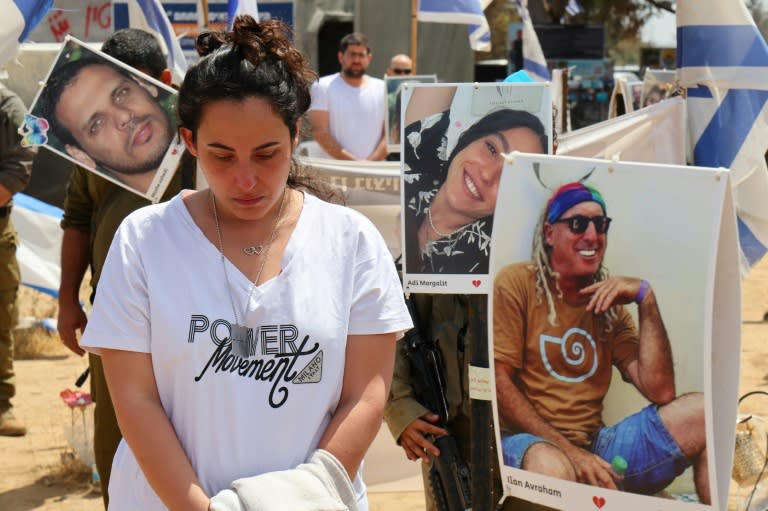In Israel, a 'different' Memorial Day amid Gaza war

An area of Jerusalem's national military cemetery, where soldiers killed in Gaza are buried, was on Monday filled with mourners and emotion as Israel marked a painful Memorial Day.
Troops from various units, distinguished by their red, purple or green berets, stood with their heads bowed, while relatives and friends cried quietly.
Yom hazikaron, or Memorial Day, pays tribute to soldiers killed in the line of duty and to victims of attacks in Israel. Commemoration events began at sunset on Sunday and lasted through sunset Monday.
The steep paths twisting through the Mount Herzl cemetery -- named after the founder of political Zionism and home to the graves of figures like former prime minister Golda Meir -- were also crowded.
Some of the graves stretching out beneath pine and fig trees were adorned with blue flower bouquets and personal items, including scarves in the red and white or red and black of the Tel Aviv and Jerusalem football clubs.
This year, "it's different", Yehoshua Shani, 61, said about Memorial Day, pointing to the graves of 620 Israeli soldiers and other security forces killed since war with Hamas began when the militants carried out an unprecedented attack on October 7.
- A father's pain -
That attack killed more than 1,170 people in Israel, mostly civilians, according to an AFP tally of Israeli official figures.
Militants also seized hostages, of whom Israel estimates 128 captives remain in Gaza, including 36 the military says are dead.
Israel's relentless bombardment and ground offensive in the Gaza Strip since then has killed at least 35,091 people, mostly women and children, according to the Hamas-run territory's health ministry.
"We are still (at) war," said Shani, describing the pain he felt as he looked at his son Uri's name engraved on a white tombstone.
A lieutenant in a unit of Israel's Golani Brigade, Uri fought for nine hours on the Gaza border on October 7, according to his father.
Uri and his troops had returned safely to their base in Kissufim, but half an hour later a rocket fell on the barracks, killing him, Shani said.
"Our wish is that we will be able to destroy Hamas," he said, rejecting any notion of a lack of national unity about the war in Gaza.
"We feel that the unity we have is more than ever," he said. "This gives us hope for the future."
- 'Every day is a memorial day' -
For Noa Lev, whose son Hagai died 22 years ago during a military mission in Rafah in the southern Gaza Strip, this year's Memorial Day is particularly bitter.
The death toll among soldiers and the roughly 300,000 reservists called up when the war began have added to her pain, she said.
Memorial Day is "very difficult for us", Lev told AFP, sitting on a small white stool in front of Hagai's grave.
"We have grandchildren and a son-in-law... fighting in the same places that Hagai fought", she said, adding that one of her grandsons is in the same unit that Hagai had been in, the Givati brigade.
"He is probably in the same place where Hagai got killed".
She said that, emotionally, Monday was not much different than other days.
"Every day is a memorial day for us."
- 'No hostages, no independence' -
Later Monday Mount Herzl cemetery saw another ceremony, marking the transition from mourning to celebration as Israel's Memorial Day gave way to Independence Day.
Until sunset on Tuesday, Israelis will mark 76 years since the creation of their state.
At the same time, Palestinians will commemorate what they call the Nakba, or catastrophe, which they associate with Israel's creation and marks the exodus or forced displacement of hundreds of thousands of people from their homes in 1948.
In parallel with the start of Independence Day, two alternative ceremonies were held in defiance of the official celebratory messages.
Thousands gathered in Tel Aviv and in Binyamina, further north, for the latest demonstration demanding the captives' release.
"A normal country does not party when 132 of its citizens are in captivity," the organisers of the more political event in Binyamina said in a statement, referring to the 128 October 7 captives and four others held since before that attack.
"No hostages, no independence," the participants shouted.
bur-al/nl/it

